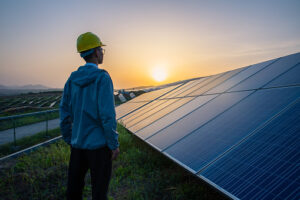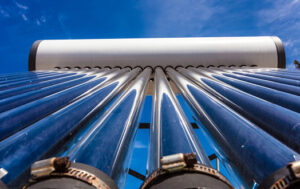A solar panel, at its core, is an electrical generator that creates power from light rays. To do this successfully, the solar panel needs to be able to absorb as many of these light rays as possible. When a solar panel is clean and free from dirt and grime, it can easily absorb more sun rays, thus creating more electricity and ultimately saving you money.
Since we never know what might happen if we don’t clean our solar panels (such as losing energy efficiency), we must discuss how to clean them to avoid any issues in terms of growing your business or company.
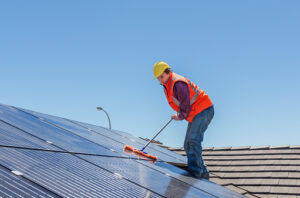
Why Do You Need to Clean Solar Panels?
It would be best if you cleaned solar panels to perform at an optimum level, which means your effort up there is not in vain.
Solar panels are composed of photovoltaic cells designed to absorb the energy from the sunlight and produce electricity. These cells are covered with glass that protects them from weather elements like dirt, dust, water droplets, etc. Combined components can block sunlight from reaching solar cells and thus reduce the ability to create electricity or renewable energy output.
A dirty panel will be less effective than a clean one because it cannot absorb as many sun rays as it should, resulting in lower power production. Some of the reasons for solar panel cleaning include:
1. Reduced Efficiency Due To Dust
Even a thin film of dirt can reduce solar panel efficiency a lot. Solar panels are designed to absorb light from the sun converted into electricity. This conversion process works best when there is an unobstructed view of the sun. If solar panels have accumulated dust or debris over time, they will not convert as much energy.
2. Inefficient Operation Due to Bugs
If you live in an area where bugs are attracted to solar panels, they will build nests between solar cells. This will prevent air from circulating, which can cause hot spots and inefficiencies.
3. Dirty Solar Panels Can Be Dangerous
Taking care of your system is very important since it could pose a safety risk if neglected. Any loose material or buildup can block access to emergency shut-off switches located on the rooftop. If this occurred during strong winds, it would be difficult for someone trying to inspect them to do so safely without taking proper precautions.
4. Bird Droppings
Birds can also be attracted to solar panels for perching, nesting, or finding shade. The droppings that accumulate on solar panels over time will reduce the amount of produced electricity and may short circuit your system.
Birds should never be allowed to perch on the panels, resulting in birds flying into them and hurting themselves.
Cleaning solar panels is considered part of routine maintenance and racking equipment. The two go hand-in-hand because without cleaning the solar panels, the system’s efficiency will be decreased. On average, you should clean your solar panels 2 to 3 times a year, depending on where you live and how much dirt there is in the environment.
Less sunlight will reach each panel when debris accumulates on your rooftop or ground-mounted solar panel array. This means that more energy will be required, so the total system will not produce as much power as it would if all panels were clean and operating at their peak potential.
As time goes by, this decrease in energy production can add up quickly, resulting in lost revenue for residential and commercial solar power systems owners.
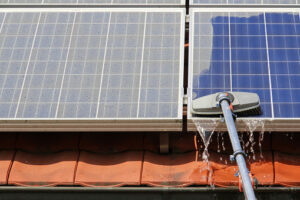
How To Gauge When It’s Time To Clean Solar Panels?
A few telltale signs will indicate when it’s time to clean your solar panels.
- One is when they’re not producing as much energy as they used to.
- Another is when you start seeing dirt or debris accumulating on the panels.
- And finally, if you notice a decrease in the overall performance of your system, cleaning the panels will likely help restore its function.
- If you see any of these signs, then it’s time to clean your solar panels.
- Another thing to consider is the material your solar panel is made from. Most are either glass or flexible plastic, and they work best when they’re clear and free of dirt and debris.
Allowing dirt and other materials to accumulate on the glass can lead to scratches that cause corrosion and degrade system performance over time.
If you see any visible buildup of debris on the panels, then clean them based on their material composition.
How To Clean Solar Panels?
Cleaning solar panels can be as simple as rinsing with a garden hose or it might involve pressure washing. There are different ways to clean solar panels. Here are some of them:
1) Robotics
According to commercial companies who have already used this method in their business sector, using robotics has huge advantages. Most importantly, it is fast, efficient, and environment-friendly. It needs no human supervision and works independently without any breakage due to weather conditions like rain or dust particles floating around in the air.
Disadvantages of this system may include high capital cost and limited reach caused by the limited battery life of robots; no additional personnel can be employed, it can’t run after dark, etc.
2) Soap-Less Brushes And Sponges
This is also an efficient way of cleaning solar panels, but it possesses some disadvantages too. It needs supervision and a good number of workers to keep the system working at all times.
There are chances of leakage or spillage near doors, windows, or vents, producing soapy water vapors inside the rooms. Some soap residues may mix with rainwater flowing down to gutters causing a temporary blockage that needs regular cleaning again and again.
This kind of contamination causes damage to plants by reducing exposed surface area for photosynthesis; restricts birds from building nests; no visible benefits for people living in that environment; does not protect solar cells’ efficiency and life.
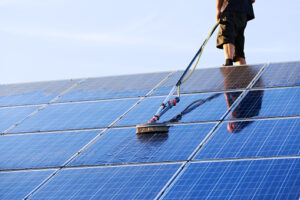
3) Waterless Vibration
The system provides a good alternative for washing solar panels without water. It is equipped with wire brushes that rotate rapidly in an alternating pattern.
These brushes are safe to use because they contain no sharp edges or loose wires that can cause injuries while cleaning the side rails and edge-sealing technique, designed to maintain a firm grip on the panel surface. It reduces the possibility of scratches by preventing dirt from getting under its bristles.
It can scrub off tough stains efficiently and dries quickly, too, due to working under sunlight only. In this manner, it works faster than other systems and causes no harm to plants or animals in its reach.
You can also hire solar panel cleaning services for keeping your own solar panels clean and clear.
How Often Should You Wash Solar Panels?
This question doesn’t have a fixed answer because too many variables are involved in predicting how often your solar panels need external washing. It depends on several factors, such as climate conditions. Where do you live, and how long will you be using the solar panel during certain seasons’ environmental conditions? Is your area polluted or not, how many hours of sunlight do you get per day on average, and how big are your panels are.
But to simplify things for you, here are some general rules of thumb:
- If you live in proximity to the sea, then you should wash your panels more often than those who live inland because saltwater also attracts dirt
- You should inspect your panels after every 4 months or so (depending on the different factors mentioned above)
- A good idea would be to wipe off any dirt particles with a microfiber cloth daily
- Finally, if more than 70% of dust is covering your panels, it’s time for a good cleaning session.

Summing Up
To conclude, it can be said that solar panels are beneficial to the environment but cleaning them regularly by any means is necessary because dirt may stop sunlight from reaching the cells, which ultimately harms plants or restricts other things living in that space.
Cleansing off dust particles and solar panel wash on regular basis will maintain its efficiency for many years. Thus, lowering your energy bill and helping towards sustainability.


